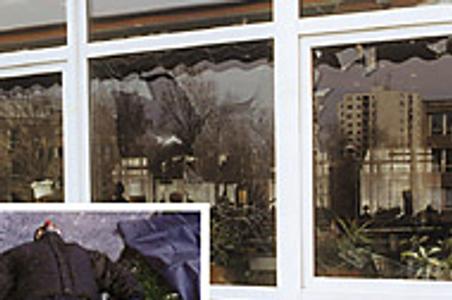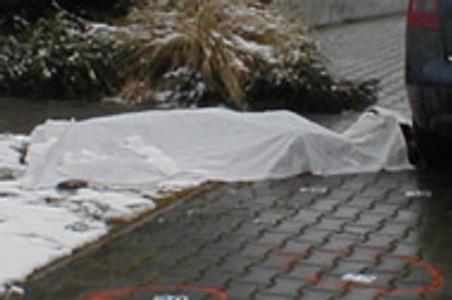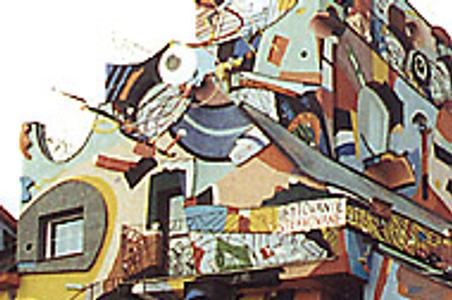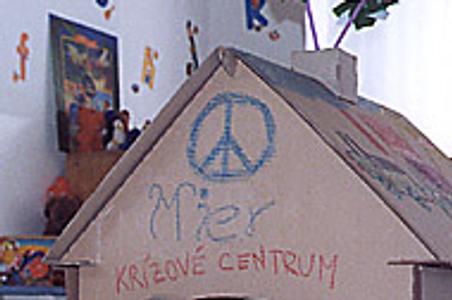Archive of articles - March 2001, page 3
If you desire to read an old article, use the search bar or select the publication date.
Laurie Farmer: Bratislava decision-making
London-native Laurie Farmer arrived in Slovakia in 1989 to teach architecture at Slovak Technical University (STU) In Bratislava. Having been an architect in England, he was prompted to leave by "the collapse of the construction market", and found himself among a group of students who were as eager to investigate the possibilities of the opening real estate market in Slovakia as he was."I had some students there, I got the exchange rate wrong and couldn't afford to live, so we set up together and soon got some good clients like Citibank, British Airways and Tesco," he remembers.After a brief return home, he came back to Slovakia full time in 1998 to set up Spiller Farmer, a property advisory firm which helps investors through what can be a fatiguing and confusing real estate acquisition process.
Commercial sector eyeing new social security system
Reform of the social security system is the key issue in the long-term sustainability of fiscal policy.The government has suggested a reform which would consist of four pillars: two obligatory and two optional. The first pillar is based on the current inefficient system. It is essential to keep this scheme, however, for a gradual transition to individual accounts, but its role in the wider scheme should be limited as much as possible.The second pillar includes individual accounts, thus identifying individuals' contributions to social insurance. The third pillar gives supplementary pension insurance companies a preferential status. Commercial insurance companies, mutual funds and banks are the last part of the social security system, the fourth pillar.
Bar beatings have police on alert
A band of roughly 20 men armed with axe staves demolished the interiors of four Bratislava bars March 1, terrorising patrons and leaving eight people injured, two of them with gunshot wounds. Police are treating the incident with more than the usual caution, not least because they fear an outbreak of Mafia violence in the capital; the assailants, they said, were Slovak, while the owners of the bars were Albanian.The violent gang first hit three bars in the Jadran shopping mall in the Ružinov district of the capital: the Daymond, Maxim Bar and Biliard Club - Lev. Ordering patrons to lie down and turn their heads, they began smashing furniture and bar equipment. Besides causing damage of 900,000 Slovak crowns ($20,000), they wounded six people, one of them the brother of the owner. The attackers also stole two guns they found in the Jadran complex, which they used in their next attack, this time on Café Regina in the heavily-frequented Old Town district.Regina suffered much the same fate as the first three sites, with the men smashing bottles and furniture, but the savagery of the physical violence used was of a different order. Two men, again of Albanian origin, were dragged out of the bar, beaten and kicked, and then shot.
Business Briefs
Six bidders confirm SP advisor interestParliament agrees with Transpetrol judge prosecutionPower distributor SSE likely to limit ŽSR suppliesSDĽ attacks government policy on ST local loops
Work law: EU rules, old world thinking
An exhaustive rewrite of Slovakia's Labour Code, which had been amended 15 times since 1991, was passed by cabinet late on Sunday, March 4. The new law brings Slovak labour law into line with European Union legislation, in part by requiring small companies that don't have unions to elect worker representatives. However, it has been criticised by business leaders for not correcting the main problem on the labour market - the difficulty of firing employees once they have work contracts.The new Labour Code, which must now be passed by parliament, is set to take effect on January 1, 2002. The document in its paper form is the size of a telephone directory for a major city; at least two thirds of it devoted to a summary of EU and international labour law, and where these directives can now be found in Slovak labour legislation. This goal of 'harmonising' Slovak rules with those of western countries, say the law's authors, was the main reason the rewrite was undertaken in the first place."I think this law is a very high-quality one, mainly because it is founded on basic international labour law principles," said Vlasta Husáriková, director of the legislation department of the Slovak Labour Ministry. "It contains many conventions from international labour organisations. It wasn't necessary to drastically improve our labour law, but we needed to bring in some EU principles which weren't expressed to the extent required."
News Briefs
Slovak actress wins coveted Czech Lion awardKukan praised for role in Czechs arrested in CubaSlovakia may open 13 remaining EU chapters this yearSlovakia defends against foot-and-mouth diseaseRoma division faulted for economic woesHuman rights magazine to be launched in Slovakia
Capital Markets : State banks continue to drive market interest
The trading mood on the Slovak capital market calmed to its usual poor standard last month, characterised by low liquidity levels, steady prices of traded issues and extremely low investor interest in the purchase of free float shares of Slovak companies as a portfolio investment.Even though the last half of 2000 seemed to be encouraging for the further development of the capital market, it appears that at the beginning of the current year it has slipped back into its old trading rut.The encouragement as 2000 came to a close had been seen in the trading of issues which enlivened the entire capital market, including Nafta Gbely (the dominant gas storage company), VÚB (a state-owned bank about to be privatised), IRB (another state financial house set for sale) and SES Tlmače (a power engineering company). Trading with Nafta Gbely culminated with the entry of a minority investor, Westfälische Ferngas AG, which took an aggregate stake of 40% on outstanding share capital. We also saw the conclusion of a Memorandum of Understanding with the majority shareholder in the Slovak Gas Company (SPP), the state gas utility.
Community Corner
Spanish exhibition in DanubianaItalian Institute film festivalLatino-American dance partySwedish exhibition for the disabledAustrian Embassy lecture and exhibitionsFrench Institute exhibitionsGoethe Institute presentationsAmCham's Business Breakfast
Nuclear scientist slain at home
As details emerge around the murder of Ján Korec, the director of Slovakia's Nuclear Energy Research Institute (VUJE) in Trnava, the motive for the murder remained uncertain.Korec was killed in the garden of his residential home by machine gun fire at 5:20 in the morning on February 23 in the quiet spa town of Piešťany. At a Bratislava press conference five days later, Slovak Chief Investigator Jaroslav Ivor said that police had arrested and charged three men suspected of the murder: 32 year-old Ivan G. and 33 year-olds Eduard D. and Miroslav Z., all from western Slovakia's Trnava.Ivor added that 46-year old Július P. had ordered the hit over a "business conflict" with Korec. A police source, who spoke to The Slovak Spectator under the condition of anonymity, confirmed that the charged was a Trnava businessman; the name the police verified is to be found in the Slovak business directory as a former partner from 1991 till 1997 in the Trnava-based Stabet construction company (under Slovak law, media are forbidden to divulge the full name of suspects until they have been convicted of a crime).
Hearts and minds: Workplace battle to continue
"If you're not left-wing when you're 20, you've got no heart; if you're not conservative when you're 40, you've got no brain".Few issues bring the heart and mind into greater conflict than that of relations between labour and business. Employers grumble if employing workers is expensive or if firing an employee is difficult, because as bosses they want their freedoms circumscribed as little as possible; whether they would appreciate the same freedoms being exercised by their bosses in turn is another matter.Workers grouse whenever their job security, salaries or perks are threatened, because as anyone who has ever performed a blue collar job knows, the object of labour, its shining triumph, is to do the least amount of work for the greatest wage. How much the attitude of workers change who have been promoted to management; how the heart initially remains with the former colleagues, but how the fondness fades amid the arid realities confronting the managerial mind.
Around Slovakia
Man steals eight kilos of ham on Ash WednesdayCharges to be laid against teenage pot smokerSkiers stuck on broken chair-lift for two hours
Riled SMK storms out of reform negotiations
The threat of the Hungarian Coalition Party, one of the five pillars of Slovakia's coalition government, to walk out on its coalition partners was renewed March 2 after the other four government parties refused to consider Hungarian suggestions as to how a crucial reform might be carried out.Political representatives of the Hungarians, Slovakia's largest ethnic minority, stormed out of negotiations after the Party of the Democratic Left, the Christian Democrats Party, the Slovak Democratic Coalition and the Party of Civic Reconciliation declined to discuss Hungarian proposals for the reform of Slovakia's public administration.The reforms are expected to re-draw regional borders in Slovakia, creating 12 new regions compared to today's eight. The conflict between the Hungarian party (SMK) and its partners has arisen over the creation of a so-called 'Komárno Region' in southern Slovakia, where most Hungarians live. The SMK had wanted the region to comprise the most populous Hungarian districts, giving the minority a greater say in any new regional government; the Slovak parties had objected, saying this would be tantamount to dividing Slovakia along ethnic lines (see story, page 2).
'Smiling House' harbours ambitions of higher education
Greta Jajcajová lives in a black apartment. And today the 35-year old brunette is dressed head to toe in black."Maybe I'm compensating for my work environment," she jokes.Jajcajová's work environment is a four-story, 1,000 square metre labyrinth of 35 colours that she and her colleagues built over seven years. Located behind Bratislava's main train station, the rainbow collision of architecture and art was finished late last summer."We don't have a name for it yet," says Jajcajová, who refers to the building simply as "the object". "Some people call it the 'smiling house' or the 'abstract house'."
US Steel managers focus of green card controversy
Management at US Steel Košice have said that they have nothing to fear from a police check on their company's employment procedures following media suggestions that they may be skirting Slovak work legislation.Following a February 28 article in the regional paper Košický Korzár, the firm denied that some American managers were working illegally, having not obtained work and residency permits following the foundation of the company in late November and the $400 million acquisition of the steel mill VSŽ."There is nobody here working illegally," Dave Luptak, general counsel at US Steel Košice, told The Slovak Spectator March 5. "We have nothing to fear [from any check by the immigration police]. We have been working with them closely to get all the required paperwork and finish this complicated process."
New centre shelters victims of violence
The pages of a 10 year-old child's diary can reveal a lot - especially if the girl's father beats her and her mother."I dreamt that dad was fighting again," reads the journal entry of Radka (not her real name) of Bratislava. "He said something very bad to mummy, and I don't remember what. When he told it to her, I told it back to him. I said the same thing back to him. Then he wanted to beat me. He had a big heavy backpack, and he wanted to hit me in the head with it. But I dodged it every time."Radka's mother calls herself Božena - not her real name either. She has given false identities for fear of being identified by her husband, a man who over the years has beaten both her and her daughter.
Parks to lay golden FDI path
After a nine-month search for suitable land ended unsuccessfully last summer, American dashboard producer Textron took a two billion crown ($40 million) investment to an industrial park in the Czech town of Hodonín.Textron's high-profile snub of Slovakia was not the first time an investor had bailed out because of land issues. Belgium firm Bekaert and France's Faurecia also left after initial investment discussions for the same reasons. However, following the February 28 approval of a long-awaited draft law on industrial parks, the situation may not arise again in Slovakia.The legislation, based on a model approved in the Czech Republic in 1998, will allow municipalities to receive financial help from the government to secure land and prepare infrastructure for foreign investors. In doing so, the government hopes, improved infrastructure would allow an investor to begin construction of a production plant immediately. At present, foreign investors have to purchase land themselves, an often complicated and drawn-out process, as well as foot the bill for creating basic infrastructure for plants.
Review: A rotten portrait of the Danish kingdom
"To be or not to be?" sings a mortally wounded Hamlet, accompanied by the gentle strums of an acoustic guitar. Hamlet has just slain his father and dead girlfriend's brother, but at death's door he turns regretful. Writhing through the courtyard, he gasps with all the melodrama in Denmark, "To be or not to be? I want to live! I want to be!"Thus ends the Czech musical Hamlet, which comes to Bratislava's Nová Scéna after a successful two-year run in Prague, where nearly all of its 80 performances sold out in advance. Written and composed by Czech Janek Ledecký, the show avoids the complex, burning emotions that made the Shakespeare original world-famous, and plays more like a series of rock videos set in ancient Denmark.The curtain opens with Ophelia and her friend Helena signing "Don't Waste Your Time", a light piano duet about the wonders of love. The two beauties seem happy just to be alive, and to have men, Hamlet and Horatio respectively, to inhabit their daydreams.
Fifth price hike package goes into government pipeline
Plans to raise deregulated prices at the start of 2002 have been praised by analysts as a bold and important economic move. The planned hikes, announced by Deputy Prime Minister for the Economy Ivan Mikloš March 5 would, if agreed to by cabinet, be implemented at the start of an election year.The hikes, which would see prices of gas, electricity, heat, transport and post rise by 10%, and water and government controlled housing rent by 23% and 35% respectively, would be the fifth set of increases since the government came to power in late 1998.While Mikloš will be trying to push for cabinet agreement to run the political gauntlet of a socially unpopular move close to elections, political analysts have said that the rise, while economically justified, will have to be accompanied by 'sweeteners' for voters.
- No more photos or bank statements? Slovakia moves to ease residence process
- Weekend: Celebration of fun comes to Malacky Photo
- Top 10 events in Bratislava for foreigners
- News digest: Prosecutor seeks jail for NBS Governor Kažimír as his political support wanes
- Convicted of multiple murders, Slovakia’s mafia boss seeks release from prison
- Slovakia loses another EV model to Spain as Stellantis chooses Zaragoza over Trnava
- Last Week: Slovakia’s central bank governor still faces bribery case verdict
- Slovak female triathlete shatters barriers with historic win at Himalayan event
- No more photos or bank statements? Slovakia moves to ease residence process
- Maria Theresa on the banks of Bratislava
- Weekend: Celebration of fun comes to Malacky Photo
- Top 10 events in Bratislava for foreigners
- News digest: Fico’s bloc wants to save money by restricting electoral access
- 3 free things to do in Bratislava in the next seven days
- Digital Jarvis is real now. He is coming for your to-do list
- Slovakia plans to restrict access to new medicines amid funding shortfall
- Maria Theresa on the banks of Bratislava
- No more photos or bank statements? Slovakia moves to ease residence process
- News digest: Violent gang in Bratislava is under arrest
- 3 free things to do in Bratislava in the next seven days
- The Kremlin’s security agency has a Russian contractor in Slovakia - no one has noticed
- Weekend: Celebration of fun comes to Malacky Photo
- Digital Jarvis is real now. He is coming for your to-do list
- Top 10 events in Bratislava for foreigners
- Maria Theresa on the banks of Bratislava
- A mayor resigns over €2.7 million fraud scandal at town hall
- Show me your moves! Slovak hockey stars share their best pick-up lines
- No more photos or bank statements? Slovakia moves to ease residence process
- He designed Gatwick. But this is his masterpiece
- Fico praises China and Vietnam as models, says liberal democracy has failed
- News digest: Violent gang in Bratislava is under arrest
- The compass points to Kúty, and people are starting to follow
- News digest: Prosecutor seeks jail for NBS Governor Kažimír as his political support wanes
- Slovakia loses another EV model to Spain as Stellantis chooses Zaragoza over Trnava
- Slovak female triathlete shatters barriers with historic win at Himalayan event
- Weekend: Celebration of fun comes to Malacky Photo
- News digest: Fico’s bloc wants to save money by restricting electoral access
- Slovakia plans to restrict access to new medicines amid funding shortfall
- No more photos or bank statements? Slovakia moves to ease residence process
- Top 10 events in Bratislava for foreigners More articles ›












